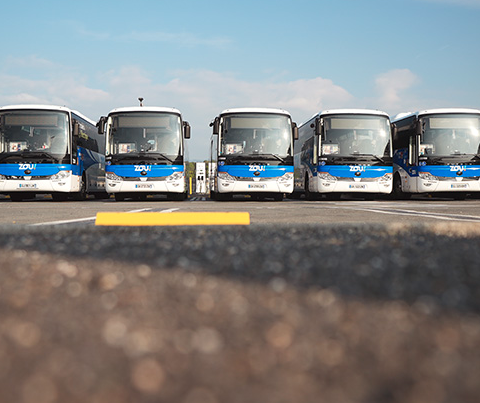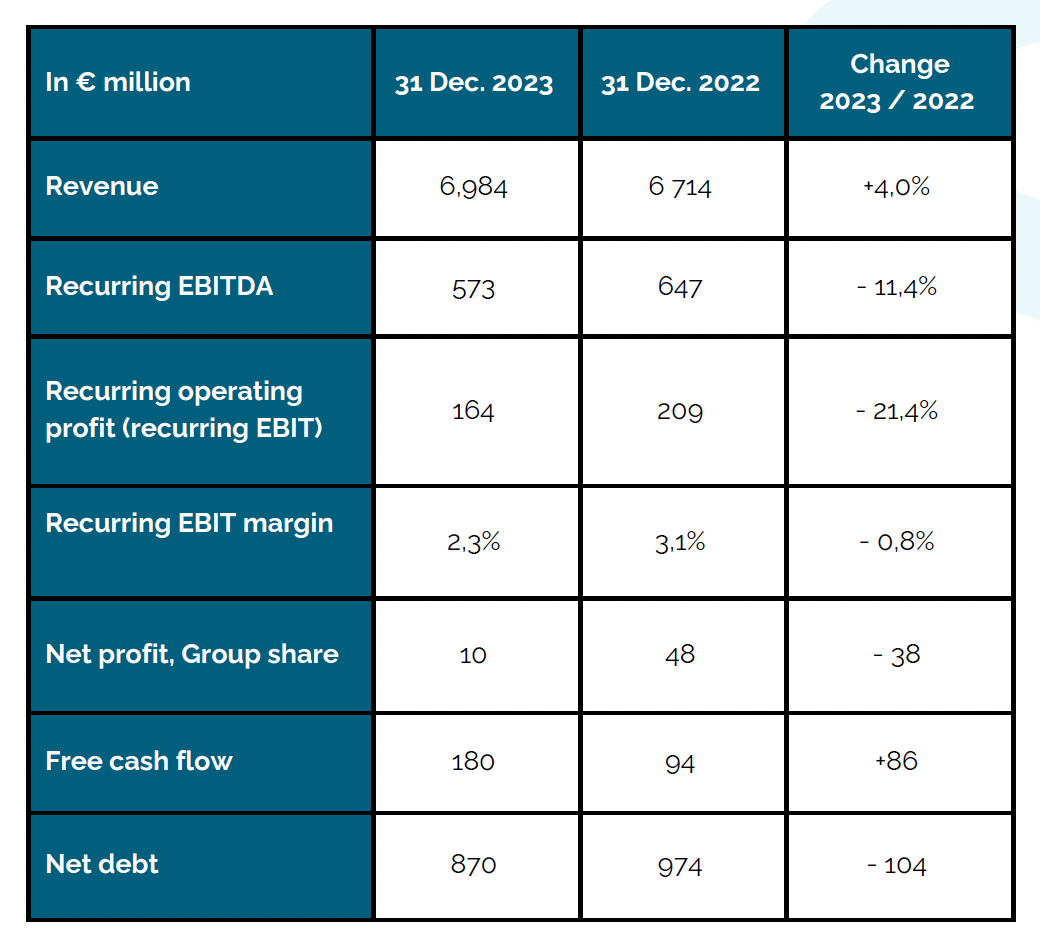“Road km travelled using non-fossil fuels doubled between 2019 and 2023”, Keolis shares within last year results
Keolis achieved revenue of €7.0 bn in 2023, up by 6.6% on an organic basis compared to 2022. The group’s recurring operating profit (EBIT) amounts to €164 million, representing a margin of 2.3% of revenue, according to the data concerning 2023 financial results just released by the company.

Keolis achieved revenue of €7.0 bn in 2023, up by 6.6% on an organic basis compared to 2022. The group’s recurring operating profit (EBIT) amounts to €164 million, representing a margin of 2.3% of revenue, according to the data concerning 2023 financial results just released by the company.
Net profit is positive for the third consecutive year, standing at €10 million, Keolis shares. However, it is strongly decreasing compared with 2022 and 2021, where it assessed at 48 and 28 million euros, as it was “mainly impacted by rising energy costs”, Keolis says.
“Free cash flow remains at +€180 million. Financial debt (excluding IFRS 16) has dropped by €104 million, standing at €870 million at 31 December 2023. The Group thus has a solid financial structure, with a leverage ratio of 2.8x”, Keolis shares.

Keolis strategy on decarbonization
In 2023 greenhouse gas emissions relating to traction, the largest item in its carbon footprint, were reduced by 5% in value and 5% per kilometre compared with 2022. Also, the proportion of road kilometres travelled using non-fossil fuels doubled between 2019 and 2023.
Several projects revolving around hydrogen were launched. An experiment is underway with Clermont Auvergne Métropole, planning the deployment of a bus route using 14 hydrogen electric powered buses. Furthermore, in association with GCK, Keolis began tests on a passenger coach that has been retrofitted to run on hydrogen, to validate the prototype and its performances. In the United States, in the Los Angeles suburbs, Keolis operates a fleet of hydrogen-powered buses on behalf of Foothill Transit.
The Group also manages a large number of electric vehicle fleets. Such is the case, for example, for the Tzen 4 operating contract, the first all-electric bi-articulated bus rapid transit route in Île-de-France, scheduled for launch by the end of 2024. This year, the Group also inaugurated all-electric interurban bus routes in the Alpes-Maritimes department on behalf of the Région SUD authority.
In Bourgoin-Jallieu, in the department of Isère, it supported an electric retrofit of three school buses, the first in Europe to receive passenger transport approval, Keolis claims. In Sweden, in the Stockholm region, Keolis won a contract to operate a network in which 80% of the mileage will be covered by electric means. In parallel, the Group has signed renewable electricity (solar power) purchasing contracts with Urbasolar. This electricity, generated in solar farms in France, avoids the annual emission of approximately 290 tonnes of carbon dioxide, Keolis says.
Over 2.5 million journeys with on-demand transportation in 2023
On-demand transportation is another big macro trend Keolis is dealing with. The group deploys this solution in more than 80 networks around the world, many of them in France. “For example, in April 2023, several months after the start-up of the Perpignan public transport contract, Keolis extended and modernised its ODT service. It now covers all the city’s suburban municipalities and better fulfils the specific needs of employees in large employment zones”, the company says. In 2023, the group recorded more than 2.5 million journeys thanks to ODT.
Keolis 2023 in France
In France, the group increased its market share in Île-de-France, in particular with the win of Grand Paris Express metro lines 16 and 17, the first metro lines in the region to be tendered out, and which will come into operation starting in October 2026. Additionally, Keolis will operate Saint-Denis Pleyel station starting in June 2024. In association with SNCF voyageurs, the Group also landed the contracts for tram-train lines T4 and T11, and the Esbly- Crécy branch of line P. Finally, Keolis began services on line T12 between Évry-Courcouronnes and Massy-Palaiseau, also working in collaboration with SNCF Voyageurs.
Still in France, Keolis underlines that “On the Optile network, we won a lot of contracts, including the 61 bus routes providing services to the western part of the Roissy Pays de France joint authority, along with two other contracts in the west of the Grand Paris Sud urban region to operate bus routes in the Haut Val-d’Oise. These contracts have increased the Group’s market share on the Optile network from 20% in 2021 to 30% in 2023”.
Keolis on the international markets: US and Northern Europe
Outside France, Keolis has developed its footprint with significant contracts in the United States and Northern Europe. Being more specific, in the United States, the Group won the contract in Orange County (California) and re-signed its partnership with Foothill Transit in the Los Angeles suburbs, with plans to deploy 33 new hydrogen electric buses. In addition, Keolis stresses it won and successfully launched bus networks in Phoenix (Arizona) and Austin (Texas), operating fleets of 300 and 430 vehicles respectively.
In Northern Europe, Keolis consolidated its footprint in Sweden with the win of a new contract with the Stockholm region, public transport authority to provide services to towns in the north and west of the capital. During the year, the Group furthermore won and started up the contract for the Valleilijn railway line, in the Dutch province of Gelderland.
“In 2023, we consolidated our position on our strategic markets, making significant gains in France and particularly in Île-de-France, in the United States and in Northern Europe, focussing on selective growth. These achievements bear testament to our ability to retain our clients and guarantee operational excellence for the benefit of public transport authorities and passengers. As a trusted partner of local authorities, we are continuing to innovate and act in favour of sustainable mobility while ensuring all our users travel safely and comfortably. In 2024 we will resolutely continue in the same vein, showcasing our expertise in major event management, with a feeling of pride and steadfast commitment during the Paris Olympic and Paralympic Games,” says Marie-Ange Debon, Keolis Group’s Chief Executive Officer.







